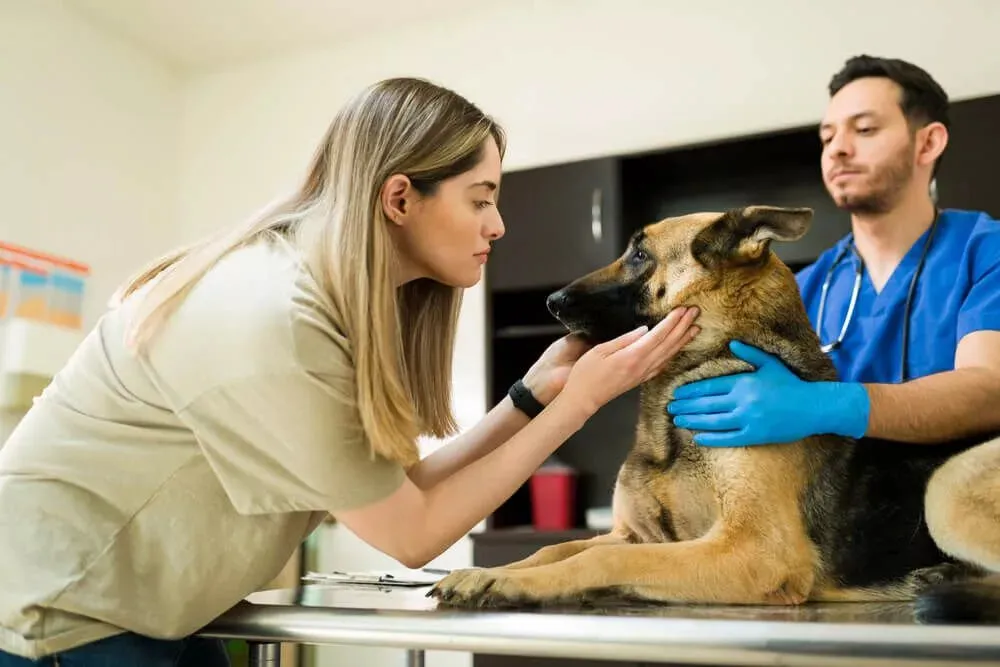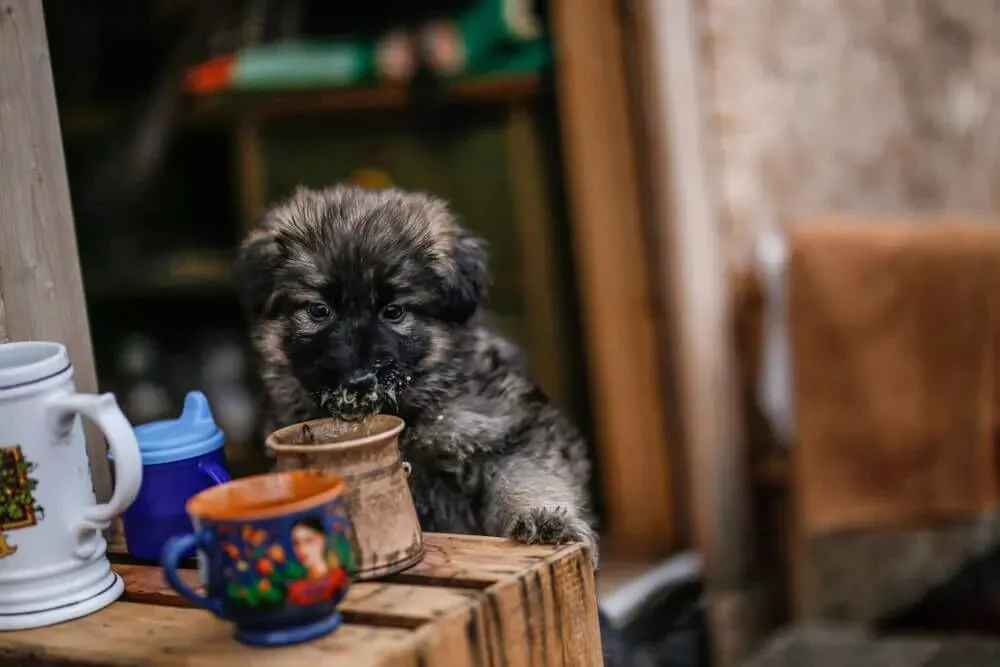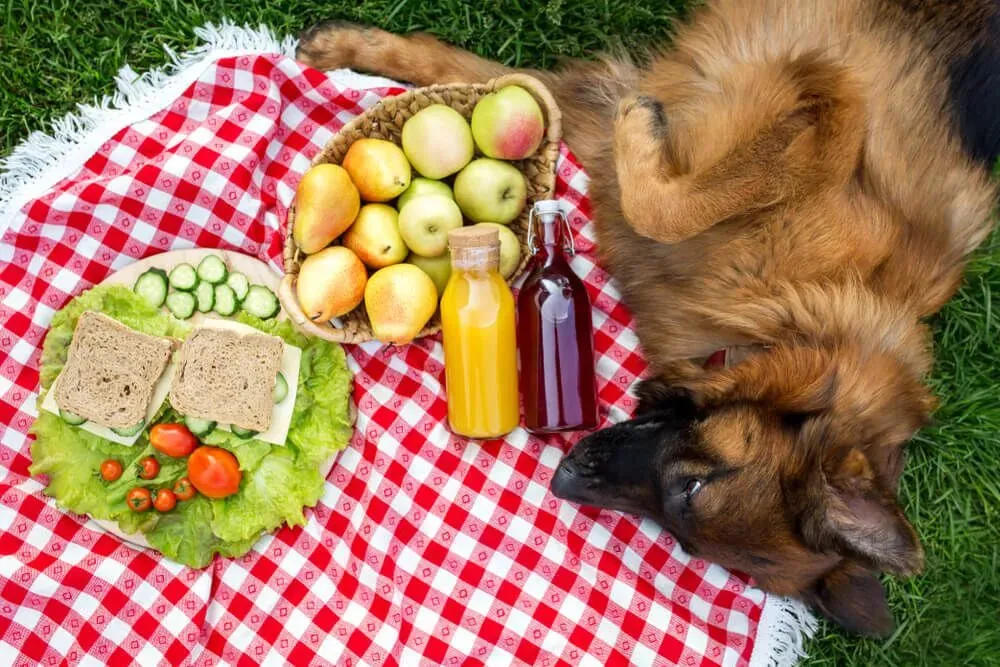The food we offer our beloved German Shepherds plays a pivotal role in their health, longevity, and overall well-being. While variety can be the spice of life for both humans and canines, it’s crucial for German Shepherd owners to understand that many foods perfectly safe for people can be highly toxic or harmful to dogs. Accidental ingestion of hazardous items is a common reason for emergency veterinary visits, underscoring the importance of vigilance and knowledge regarding your German Shepherd’s diet. Ensuring your German Shepherd gets proper nutrition and avoids harmful substances is a cornerstone of responsible pet ownership.
Recognizing Signs of Food Toxicity in German Shepherds
Knowing the signs of food toxicity is paramount for any German Shepherd owner. Early detection can make a significant difference in the outcome. If you suspect your German Shepherd has consumed a toxic substance, immediate veterinary consultation is essential. You may be advised to induce vomiting, or more likely, to monitor your dog closely at home or bring them to the clinic for treatment. For immediate guidance, helplines like the Pet Poisons Helpline offer valuable advice from veterinary professionals who can assess the situation and recommend the next steps.
Common signs of food toxicity in German Shepherds include:
- Vomiting
- Diarrhea
- Lethargy or unusual weakness
- Tremors or seizures
- Ataxia (loss of full control of bodily movements) or wobbly episodes
- Increased thirst or urination
- Loss of appetite
Upon realizing your German Shepherd may have eaten something toxic, do not hesitate to contact your veterinarian. In some cases, waiting for symptoms to appear can be too late, as certain toxins cause irreversible damage before signs become evident.
 Lethargic German Shepherd exhibiting signs of food toxicity next to an empty bowl
Lethargic German Shepherd exhibiting signs of food toxicity next to an empty bowl
Foods Your German Shepherd Must NEVER Eat
A toxic food is one that can cause severe internal organ damage or systemic harm if consumed. The following foods are strictly forbidden for German Shepherds due to their dangerous effects.
Alcohol
Alcohol consumption in German Shepherds can lead to vomiting, diarrhea, lack of coordination, excessive salivation, and increased thirst. In severe instances, alcohol can cause liver damage, respiratory failure, and even death. During parties or gatherings, ensure alcoholic beverages are kept out of your German Shepherd’s reach.
Garlic, Onions, and Chives
All forms of garlic, onions, and chives (members of the Allium plant family), whether raw, cooked, or powdered, are toxic to German Shepherds. They can cause damage to red blood cells, leading to hemolytic anemia and affecting oxygen transport in the body. Ingestion also commonly results in gastrointestinal inflammation, leading to vomiting, nausea, and reflux. These are common ingredients in human sauces and meals, so always check labels before sharing leftovers.
Xylitol
Xylitol is a highly dangerous artificial sweetener found in numerous products, including sugar-free gums, candies, peanut butter, toothpaste, and baked goods. Even small amounts can cause a rapid and severe drop in blood sugar (hypoglycemia) in German Shepherds, leading to weakness, collapse, and seizures. If you need to give your dog medication and are struggling, seeking professional advice on what to do to get your dog to eat is much safer than using human foods containing xylitol as a distraction.
Caffeine
Present in coffee, tea, energy drinks, and chocolate, caffeine acts as a neurological stimulant in German Shepherds. It can significantly increase their heart rate, leading to restlessness, hyperactivity, vomiting, and diarrhea. Large doses can result in liver damage and potentially fatal arrhythmias if not promptly treated.
Grapes, Raisins, and Sultanas
The exact toxic mechanism of grapes, raisins, and sultanas remains unknown, but their ingestion can lead to acute and irreversible kidney failure in German Shepherds, which may not become evident until it’s too late. The toxic dose is also unknown, meaning even a single grape or raisin can be enough to cause severe issues in some dogs. Any consumption of these fruits should be treated as an immediate emergency. If your dog is showing signs of distress and you’re unsure what can you feed a sick dog, always consult your vet first.
 German Shepherd looking at human food on a table, highlighting the risk of toxic foods
German Shepherd looking at human food on a table, highlighting the risk of toxic foods
Harmful Foods German Shepherds Should Avoid
Beyond outright toxic substances, certain foods pose significant physical hazards or can cause severe digestive upset in German Shepherds.
Corn on the Cob
A popular barbecue item, corn on the cob can be extremely dangerous for German Shepherds. If swallowed whole, the cob can become lodged in the stomach or intestines, causing a life-threatening obstruction that almost always requires surgical removal. Always remove corn kernels from the cob before offering them to your German Shepherd, and only in small, appropriate amounts.
Uncooked Yeast Dough
Raw dough containing yeast, such as bread dough, continues to rise and expand inside a German Shepherd’s stomach. This expansion can lead to severe bloating, stomach torsion (bloat, which is a medical emergency for German Shepherds), and can also produce alcohol as the yeast ferments, leading to alcohol toxicity. Symptoms include vomiting, diarrhea, and significant abdominal pain.
Cooked Bones
While raw, appropriately sized bones can sometimes be safe for dogs, cooked bones are a major hazard for German Shepherds. Cooking makes bones brittle, increasing the likelihood they will splinter into sharp fragments. These fragments can cause lacerations, perforations of the esophagus, stomach, or intestines, or lead to serious obstructions requiring emergency surgery. Opt for chew toys or specially designed dental treats instead of bones. If your German Shepherd is unwell and refusing food, understanding what to feed a sick dog is vital, but never offer bones.
 Owner preparing safe vegetables for their German Shepherd, illustrating appropriate food choices
Owner preparing safe vegetables for their German Shepherd, illustrating appropriate food choices
What Can German Shepherds Safely Eat?
While the list of forbidden foods is extensive, there are plenty of healthy and safe options for your German Shepherd beyond their regular kibble.
Safe Human Foods in Moderation
Many human foods can be given to German Shepherds as occasional treats, provided they are prepared correctly and offered in small quantities. Examples include:
- Lean Meats: Cooked chicken (boneless, skinless), beef, lamb, and turkey are excellent sources of protein.
- Cooked Eggs: A great source of protein and essential nutrients.
- Certain Vegetables: Carrots, green beans, peas, and cooked sweet potatoes are nutritious and fiber-rich.
- Fruits: Apples (without seeds), bananas, blueberries, and watermelon (seedless) can be healthy treats.
- Plain Rice or Pasta: Small amounts of cooked plain rice or pasta can be easily digestible and useful, particularly if you are considering food for a sick canine.
- Plain Yogurt or Cottage Cheese: In small amounts, these can be good sources of calcium and probiotics, but monitor for lactose intolerance.
Always introduce new foods slowly and in tiny portions to observe any adverse reactions. If you’re wondering what foods can i give my dog from your plate, always err on the side of caution.
High-Quality Dog Food
The cornerstone of any German Shepherd’s diet should be a high-quality, commercially prepared dog food specifically formulated for large breeds and their life stage (puppy, adult, senior). These foods are nutritionally balanced to meet all your German Shepherd’s dietary requirements, taking the guesswork out of their daily meals.
Preventing Accidental Ingestions
Preventing your German Shepherd from accessing harmful foods requires proactive measures:
- Secure Pantry Doors: Use child-proof locks or ensure pantry doors are always tightly closed.
- Lidded Bins: Invest in sturdy, snap-lock garbage bins that your German Shepherd cannot open.
- Educate Guests: Inform visitors that feeding your dog without permission is prohibited.
- Supervise Meal Times: Never leave human food unattended where your German Shepherd can reach it.
- Store Medications Safely: Keep all human medications, which can be highly toxic, out of paw’s reach.
Summary
Understanding what your German Shepherd can and cannot eat is a critical aspect of their care. While there are many safe human foods that can be offered in moderation, an even longer list of items can cause severe illness or be fatal. By being informed, vigilant, and proactive in preventing access to dangerous foods, you can ensure your German Shepherd remains healthy and happy. Always consult your veterinarian before making significant changes to your German Shepherd’s diet or if you suspect they have ingested something harmful.
FAQ
What human food can German Shepherds eat?
Examples of safe human foods for German Shepherds include small amounts of cooked pasta or rice, cottage cheese, lean cooked meats such as chicken, beef, or lamb, and eggs. The list is quite long! Always feed in small amounts and verify it’s a safe food before offering it to your German Shepherd.
What fruits can German Shepherds not eat?
Grapes, raisins, rhubarb, unripe tomatoes, and stone fruits such as cherries, peaches, and plums (due to their pits) are all harmful to German Shepherds if eaten.
Can a German Shepherd eat ice cream?
Many dogs are lactose intolerant, so foods like ice cream can cause tummy upsets. A small amount of plain ice cream as an occasional treat will probably be okay, but large amounts or frequent consumption can lead to bouts of vomiting and diarrhea.
Can German Shepherds eat potatoes?
Never feed your German Shepherd raw potato, as it contains Solanine, a toxic compound to dogs. However, baked or boiled potatoes, in small amounts and without seasonings, are generally safe to feed.
